

“There is nothing new under the sun, but there are new suns.” —Octavia Butler

25-30 minute conversation, or the time it takes to prune an old tree.
![]()
A CONVERSATION WITH DAFNA NAPHTALI AND CC SUNCHILD
Dafna Naphtali and CC Sunchild’s artistic journeys unveil the intersections of creativity and spirituality. In the following conversation, they reflect on recent collaborations, exploring the merging of distinct influences into harmonious compositions. Naphtali is drawn to trees that adapt, weaving their struggles into beauty, while Sunchild describes an ethereal encounter during a period of illness that has shaped their approach to music. Their discussion demonstrates their ability to weave challenges into transformative narratives, crafting thoughtful moments of artistic growth.
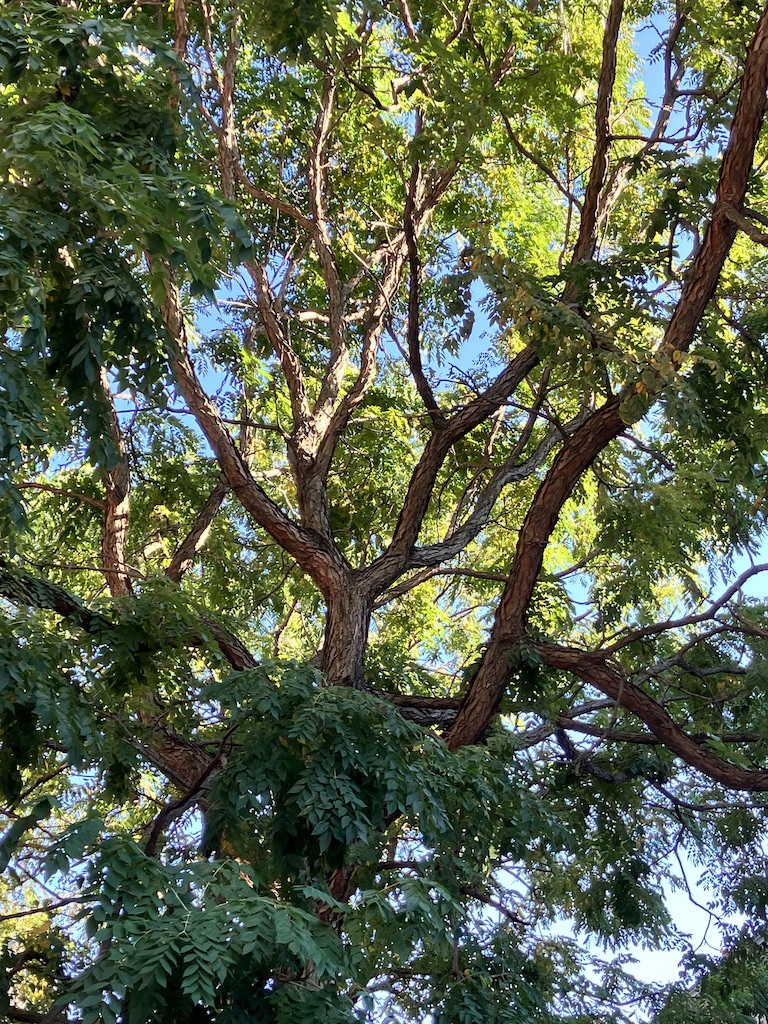
[ID: A large tree with many outstretched branches like raised arms against a blue sky.]
Luz Orozco: To begin, I’d love for you both to read a few sentences from your Anthology writings and speak to what you were thinking about when writing them.
Dafna Naphtali: Sure, my name is Dafna Naphtali. I’m from New York.
Many of my photos are of trees that survived in unusual ways, trees that adapted and grew around or through their obstacles, right through fences and gates, absorbing and incorporating them right into their bark. The scarring and improbable survival of a tree can be beautiful. It challenges me to embrace flaws and imperfections, and to be creative with plans, change course if needed and grow around obstacles.
I take hundreds of pictures of trees and I have not yet figured out why. I don’t know if they’ll become [music] scores. As I reflected on it for the writing for the Anthology, I realized that part of this really is about trees being able to survive unbelievable things that happen to them and that sometimes their scarring is actually a part of their beauty.
CC Sunchild: Yeah, I think that’s really amazing. I actually stare at trees and talk to them all the time. It’s like I can feel the sentience of them, I can feel the fullness of their knowledge. It’s like giving us a reminder that one, we’re going to make it, and two, we have everything we need. Even in its barest, in the rawest form, in the winter, when there’s nothing there, it’s like, “You’re still beautiful. You’re still doing it. You’re still doing the thing you’re here to do even when there are no leaves on you.” You know what I mean? “Even when you’re not adorned by the flowers, you’re still being amazing.” I think we’re the same.
Thank you for sharing your reading Dafna. I’m CC Sunchild and I’m going to read a bit of mine as well.
I can feel myself shining like the Sun. I Am one with this Sun and I Am one with this new Being as I’m entering. I am feeling my Self as She. I am Being as She Be. She is realizing that something beautiful is happening. So She picks up her cell phone to capture this glow that is radiating from her soul. Click of the thumb, one photo after another, she knows, …something new is here and something old has returned to the Source.
I wrote this during a period of extreme illness; I was really sick at the beginning of the M³ (Mutual Mentorship for Musicians) project. Through the whole thing, I was having issues. I’m still recovering honestly. During this period, even though physically I was going through something so extreme and so significant, there seemed to be something spiritual happening at the same time. It felt like there was this merging of an aspect of myself from a different realm. From even maybe the future in another timeline, in a different realm, that was merging with the aspect of me that was here in this space.
I actually stare at trees and talk to them all the time. It’s like I can feel the sentience of them, I can feel the fullness of their knowledge. It’s like giving us a reminder that one, we’re going to make it, and two, we have everything we need.
During this period, I was able to see from two perspectives at the exact same time. At the beginning of this [illness] — I don’t want to call it division because it was division and unification at the same time — I was being multiplied and I was coming into oneness at the same time. When this was happening, there was an awareness of everything around me in the physical realm, the sun, the sky, the clouds, my physical body, and then there was also this awareness of this ethereal realm that encapsulates other aspects of myself. And I could actually physically — and beyond the physical — feel this happening. I felt like I could see it and taste it and smell it: everything at the same time. I was trying to find words to describe this and it just kind of all just came out like rushing waters. I just wrote it all in one moment. I didn’t even know that I had written it.
Then, when we were asked to write for the Anthology, I looked back and saw I had already written the whole thing. So really, I didn’t have to write anything else. It just happened to be the exact number of words we were asked to write, too. It’s really interesting because it just kind of came out of me without thought. So yeah, this is where this came from. I really wasn’t thinking about anything in particular. I was just being about it and then the writing came out of the being.
Dafna: I really loved what you wrote about something new and something old. You were feeling both the renewal and how it related to your previous self.
CC: Yeah.
Dafna: [You were] feeling very grounded in spite of the fact that you had this difficult time.
CC: Exactly.
Dafna: I’m thinking that this is another example of taking a moment that could be really negative and finding something very positive.
I don’t look at the trees and think about the past and present, interestingly, although sometimes [the trees have] been there for so long. If you’re looking at much older growth trees, it’s an interesting perspective. I’ve been focusing on what’s right in front of me and the present.
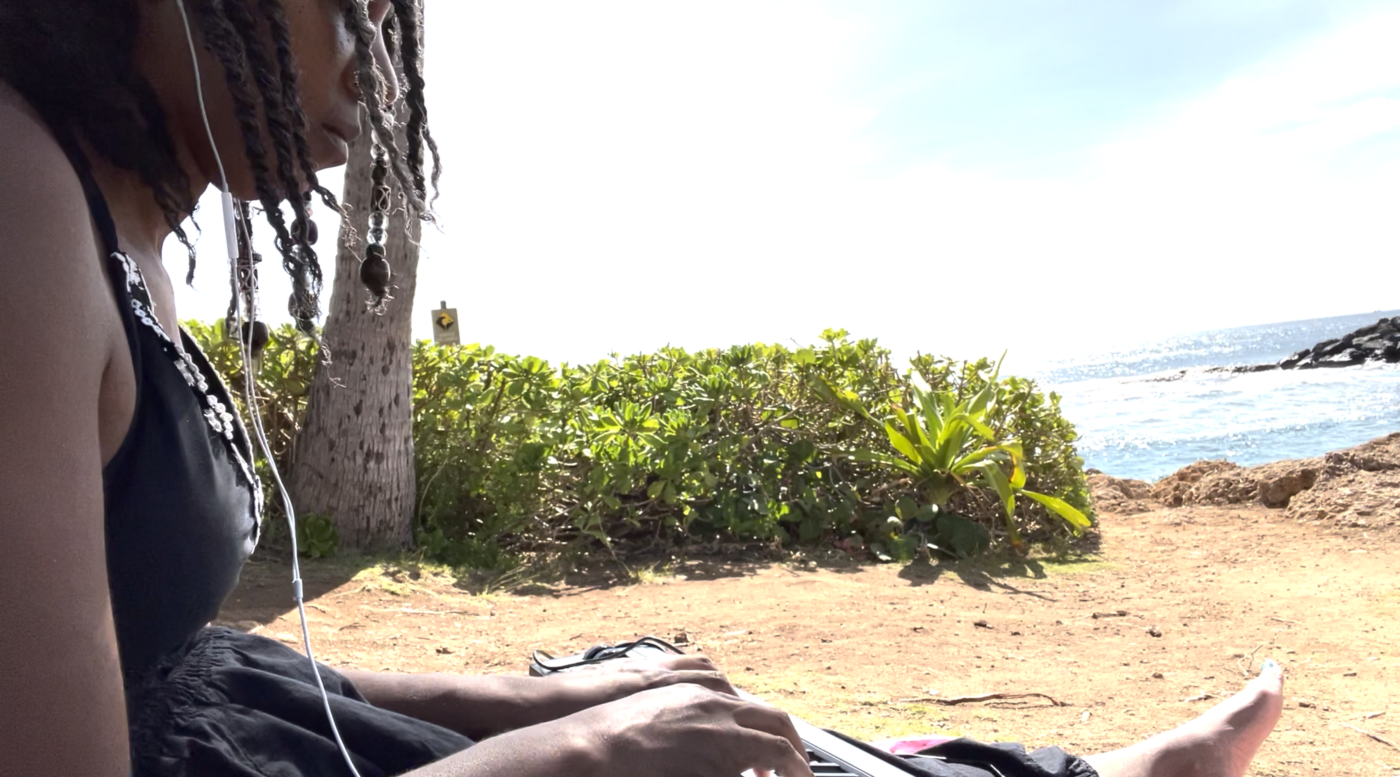
[ID: CC is sitting on the ground by the ocean on a bright sunny day playing music on a keyboard. They are wearing all black and their twists are blowing in front of their face as they look down at their hands.]
CC: Yeah. It’s interesting you say that too, because, one of the things about the [written] piece and the way that I was feeling [was that] it felt very much like an ancient future. That term came to me while I was dealing with this season. It feels like an ancient future, like, it’s all one. I mentioned in our meetings that it’s about being “in the now.” With “the now” having all of the aspects of everything in it, it feels very much like time just dissolves. It’s all here and we have access to all of it.
Dafna: It’s also about memory. My sister recently brought up an article she read about memory and they were saying that sometimes [older people] might forget some things that are happening right now because they’re busy processing things that happened in their lives a long time ago, reordering their whole life history and rethinking. Maybe what you’re feeling is some of that. There’s something new happening and, at the same time, I’d like to think that as we get older, we don’t just deteriorate.
I remember once going and getting a pair of shoes after I had my children and my feet got wider. And I was feeling bad that my feet were bigger and the guy at the store was so great. He said not to worry, “This just means you have more responsibility now.”
(CC and Dafna laughing).
And I felt like a tree! What you’re feeling is maybe the impact of growing a new skin, which is something that’s constantly happening. That comes from inside and goes out [the way that bark grows].
CC: Yeah, expanding. Taking up more space, taking up new space, or the awareness of the space that you already took up. You know what I mean?
What you’re feeling is maybe the impact of growing a new skin, which is something that’s constantly happening. That comes from inside and goes out [the way that bark grows].
Dafna: It’s taking up space, and allowing yourself to take up space, which is something that we’re not necessarily trained to do. The nice thing about the M³ [cohort] also was the range of ages and generations. It was wonderful to hear so many perspectives.
One of my kids once looked over an email I was writing and [they] said, “Why are you apologizing?” And I was like, “I don’t know.” They said “Take that sentence out.” I was like, “Oh good, I raised the human who could tell me to stop apologizing.”
I mentioned that story to somebody last night and he said, “I think it’s a gendered thing because I don’t remember ever apologizing.” Maybe it really is. I was raised by a radical feminist and I still find myself apologizing, not wanting to take up space. That story about this guy at the shoe store telling me “you’re more responsible now” resonates a lot. It relates in some way to what you were feeling. You become a new person, there’s the next part of your life.
You were rethinking how you were gonna perform. I had a period a while back where I injured my voice. I was momentarily thinking, “What is my music life gonna be like if I can’t sing?” That was scary, but I was confident that nothing could ever stop me from being a musician.
While we were in the period that [our cohort was] meeting with each other, I rewrote my bio and personal story to be less apologetic. I’ve been working as a musician for a long time, making all kinds of stuff, but while I was raising my kids, the projects got smaller and smaller. I was working with just one person at a time, lots of duos. I did this for practical reasons, but it ended up being a really good thing. You explore something new that you hadn’t expected to explore because that was the door that was open or that was the pathway that was open.
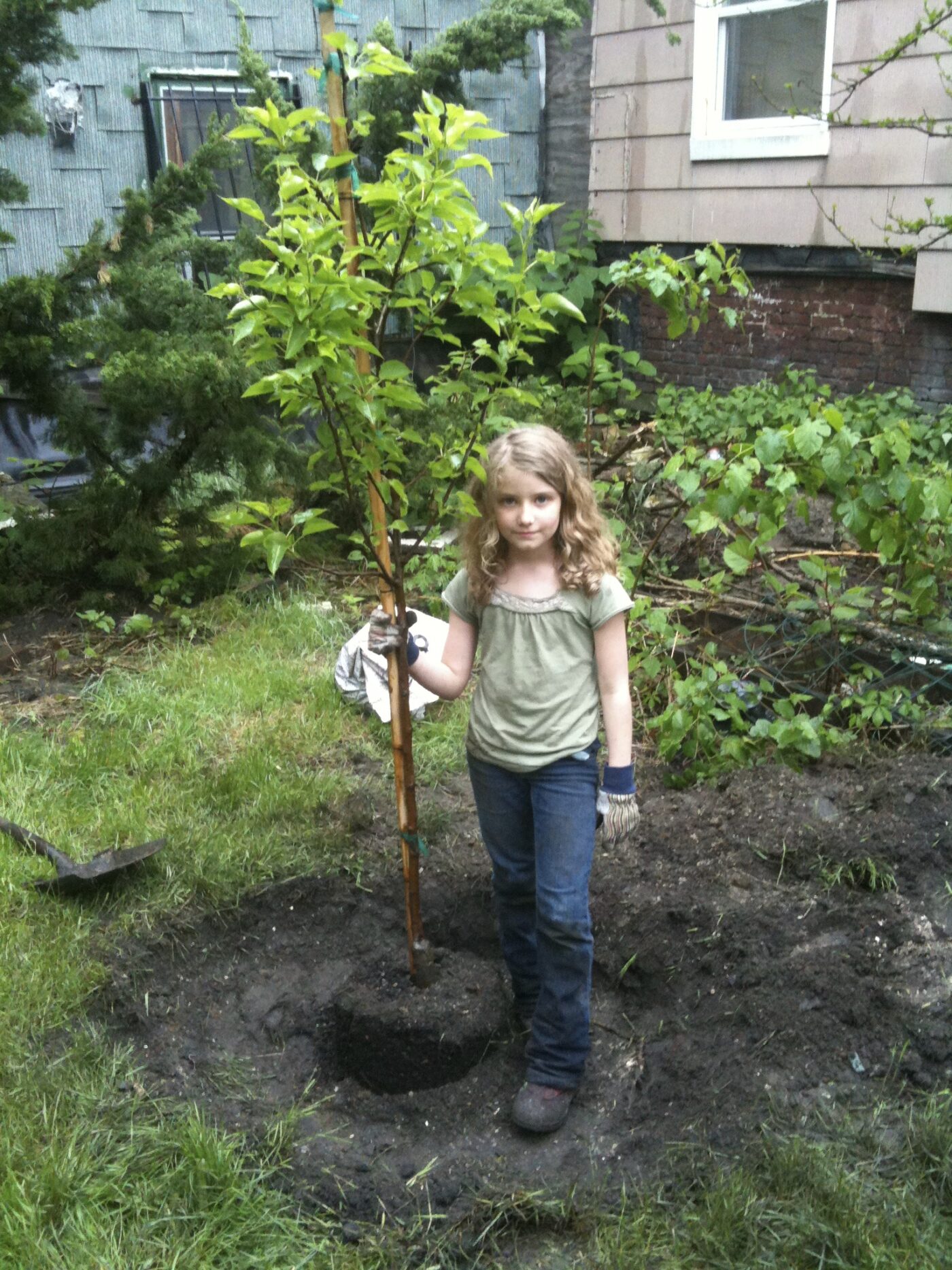
[ID: A young girl stands alongside a sapling, a look of determination and purpose on her face. She stands in fresh dirt wearing work gloves with a house and some greenery behind her.]
I found the fullness in the stillness. I found the fullness in what seemed to be a void. I was so used to the noise of life itself and of the external noise of our musical expression. I had to find the internal resonance through the quiet.
CC: We can be so focused on music in the way that we have been doing it in the past or on the external things that are happening in our world. Sometimes it takes something that causes you to have to be stilled or quieted to have to look at things from a whole new perspective. Just to show you who you’ve been all along. “Who’s in there?” You know, you find something new. That’s the brilliance of life and its challenges and creating through improvisation. You get to a place where there may be what seems to be a “mistake,” but the joy is exploring and trying to find a way out. “How am I going to get out of here? What can I find?” That’s how you find these other worlds.
Dafna: Did you find yourself doing more improv during this period? Were you writing more?
CC: It was more the learning, more the exploration internally. Sensory input was an issue [for me]. I couldn’t really handle sound, movement, lights, or conversations. I could barely talk. It affected my processing speeds. I couldn’t really work. I couldn’t watch movies, TV, or listen to music and stuff like that. I just found the music in the quiet. I found that to be really, really, really beautiful and resonant. And then, I found the fullness in the stillness. I found the fullness in what seemed to be a void. I was so used to the noise of life itself and of the external noise of our musical expression. I had to find the internal resonance through the quiet. Everything was quiet and stillness, [being] in isolation.
Luz: CC, your writing also has elements of science fiction, and I wonder if that is something that interests you and bleeds into your musical practice?
CC: Actually, I don’t have any interest in science fiction at all and it’s very strange because I felt like I was writing a true story. (Laughter) I was writing it as a prelude to further write the rest of what I felt happened to me during this seven month period.
Someone else asked me the same thing. They were like, “Yo, this sounds like a sci-fi movie.” I was like, “No, this is a true story, this really happened!” They were like, “Wait, are you saying you came from another planet and you came into your body and from another planet from [the year] 2050 something?” and I was just like, “Yeah that really happened! It happened on October 4th!” So maybe I’m going into sci-fi and I don’t realize it. I’m really doing it because I believe in it.
Sometimes I think my music can sound a little otherworldly depending on what it is, where I am, and who I’m being at the moment. There are so many different ways to approach things, and things that I’ve been exposed to musically. It oozes out in different ways at different times stylistically. In terms of genre, it just flows out. I don’t really have a specific lane or genre that I’m falling into.
I loved the collaboration with Sattvitri. She’s an Indonesian, Balinese Gamelan player. She was the musician that I had to compose with for M³. It was really interesting because it was a totally different genre from what I was used to. [The collaboration] brought out a lot of the orchestration that I love to do. It helped me to connect with rhythms in a different way; it was almost like putting puzzle pieces together, so it was really cool. I love working with musicians from different countries and with different approaches to music, and then bringing that together and creating this new sound, this new being through art.
Dafna: It’s true sci-fi! (Laughter) I’ve been listening to your music, CC, because I wanted to know more about it. I was just listening to you do a piano improv and I heard a lot of the songs that were on this one album that [felt] between genres. You can hear all the different influences.
CC: That’s so awesome, thank you.
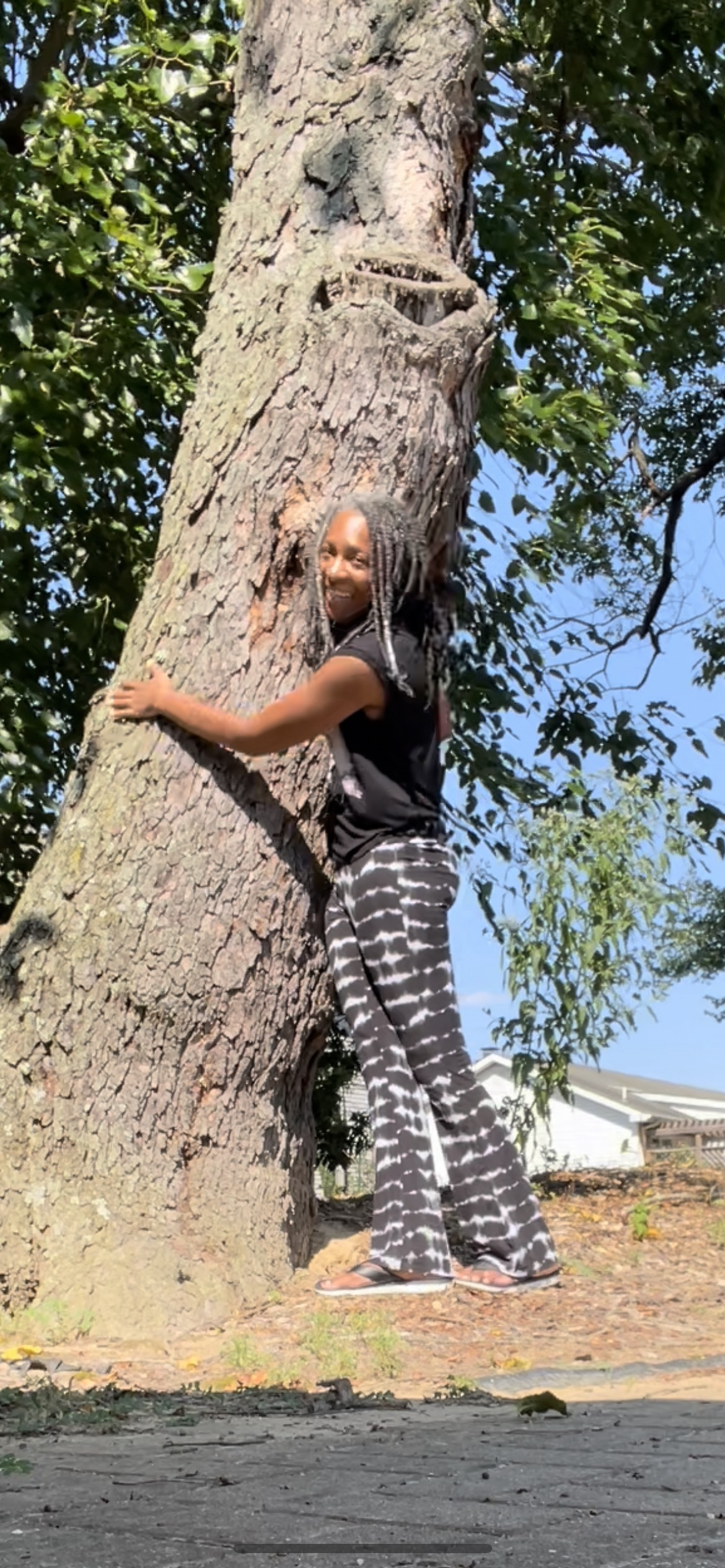
[ID: CC smiles at the camera as they hug an old tree on a sunny day. They are wearing a black shirt with black and white tie-dye pants and sandals.]
So anyway, we just put these personal ideas in there and then just have to hope that someone else will hear it and get something from it. I don’t think anybody needs to know the exact details of what it meant.
Dafna: I’ve done so many different kinds of music in my life and within the last fifteen, twenty years it’s been more electronic, but I solidly came from the jazz world. I like to think of myself as “a jazz reject.” During this period, I stopped playing guitar — I don’t know why because that was my original instrument. In school, I was a jazz guitar major. So, I told my partner, Gwen Laster, a violinist, that I wanted to bring in some guitar. I had been casually recording improvs with guitar and voice on my phone, and Gwen picked the parts that she liked best as a starting point for us. She brilliantly reimagined what they could be. Once we chose them though, I had to figure out how to actually play the pieces so I could properly record them. In some cases, the original recording was the best, and sometimes I really had to re-record.
I had the opposite experience [from you, CC] because Gwen is a musician here in New York with one degree of separation in our musician community. People said, “Oh great, you get to play with Gwen! She’s awesome. I did this and this with her!” And Gwen had the same experience where people said, “Oh, you’re gonna play with Dafna. That’s great!” We were maybe the only people [from the M³ cohort] that got to work with our partners in person. You think that would be an advantage, but with busy schedules, it was still really hard for us to find times to meet.
Anyway, Gwen did come to my place and we did a recording session. I’m the person who has a bazillion ideas and needs to tone it down. It was great working with Gwen because she is very decisive: “Let’s do this. Let me add this line right here.” She would take something I did and completely recontextualize it by adding in a different set of notes and spoken words. She was down for trying anything and that was wonderful, but it was not as much of a cross-cultural [piece] because we’re both very much in the free jazz improvised music scene here in New York.
We connected on a personal level. The fact that I had recently lost my father and resonated with her sense of loss about her own father. We made a piece that relates to what you wrote CC — it’s about the past, present, and future all happening at the same time. My father was a scientist and had always said he was an agnostic because he could not prove nor disprove spiritual beliefs. My feeling at the very moment I knew that he had passed was, “I guess you’ll find out now.” I just have this imagination that he’s just somewhere in the universe, because it’s hard for me to believe or accept that his soul is just gone, dissipated. This relates very much to what you were saying.
So anyway, we just put these personal ideas in there and then just have to hope that someone else will hear it and get something from it. I don’t think anybody needs to know the exact details of what it meant.
Your [collaboration] with Sattvitri, it was just such an ode to nature, beauty, and the universe. That’s what it really felt like. You also took some pictures of yourself out in nature, right? There was something about her doing that on that side of the planet and you doing it on this side of the planet. It was just gorgeous.
CC: Thank you so much. So really, for you, maybe then it’s also part of the collective experience that’s making it for you?
Dafna: Absolutely.
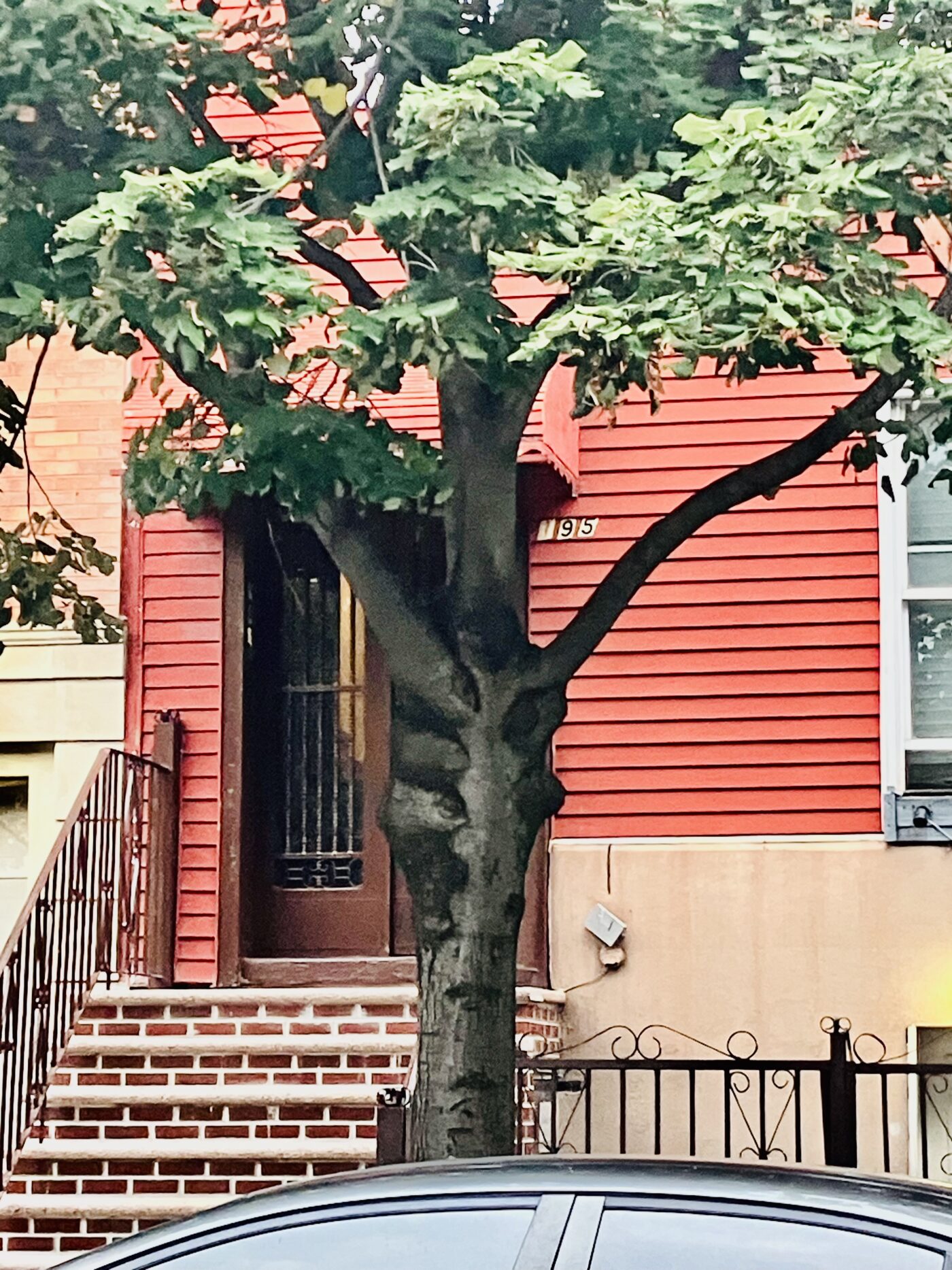
[ID: A tree with a gnarled trunk stands in front of a red house with brick steps. It almost seems to be a hand — strong and secure holding itself up.]
CC: I find for me, no matter who’s here or who’s with me during improvisation, if I am able to connect to my inner collective — there’s also a we in here [points at self] — I hear others singing with me, even if I’m just singing with a horn player. I’m hearing other voices, I’m feeling the ancestral rhythms. I’m hearing things from other spaces because of the communication that’s coming from whatever other instruments and other people that I’m improvising with. That’s communication, you know what I mean?
I’m hearing whatever that language is, and that language speaks to this other part of me that I guess resonates internally in a similar way as it does when I’m singing a hymn with a group of people in a religious setting. Once I allow myself to go through the door that is not in the head, that’s in the heart, that goes past the heart, to the other space, then you can hear all the other people [inside] and I feel like we are having a party. So, it’s got the same communal, collective, worshipful celebration, or sacred celebration.
Dafna: Right, and I’m probably concentrating on the people I’m playing with and the sounds that maybe I haven’t accessed. I think also working with technology is like working with a really complicated instrument. Because even though I’m not thinking about it, I’m listening to room acoustics. Sometimes that doesn’t feel spiritual to other people but, to me, it’s like I just got the room to move.
CC: It is. Yes!
Dafna: You know, so that’s part why I like laughing sometimes [during improvisations]. You’re helping me understand why singing songs with text, where it’s a collective experience, where I was leading other people, was a powerful thing for me in the past. There is a little bit of a divide between some areas of my practice, and I’m learning every day about how to make it all function.
Do I make less electronic music or something that’s simpler to deal with? I’m like, “No!” Because I really love feedback. But it’s not to say that everyone will understand what I’m doing [besides] the people on stage with me, who I play with, they probably will and get what I am doing. There are some experiences that can be experienced by more of the collective around you.
I love your concept of all the other voices that are with you and that some are ancestral. I might only feel that in other circumstances. I don’t play solo that much. For me, making music is about making music with other people. I mean, the piece I just made, that is very much a solo piece, but I am basically taking one sound and turning it into many voices around me.
CC: So, that’s still not just you. You just moved the room and brought more people in from yourself. You know what I mean? You still added a community.
Dafna: I just can’t wait till next time I do this, and I can think about what you said.
Header Photo Credits:
Photo of CC Sunchild courtesy of the artist; photo of Dafna Naphtali by Maya Naphtali.
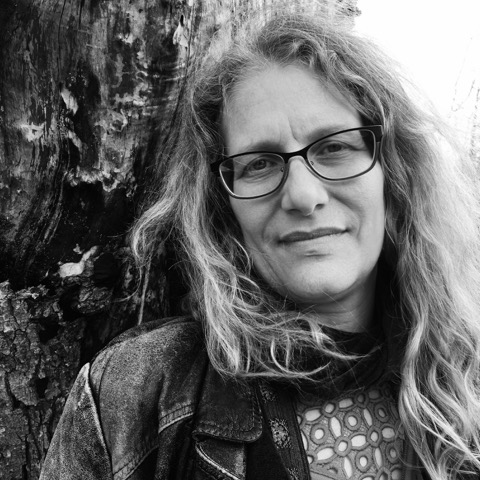
[ID: A black and white photo of Dafna, a woman with light skin and long wavy hair. She leans against a tree wearing a denim jacket and dark-rimmed glasses.]
Dafna Naphtali
She // Her // Hers
Brooklyn, NY
Dafna Naphtali is a singer, electronic musician, sound artist, improviser, and computer programmer. Naphtali’s eclectic musical background informs experimental work for live processing of sound using acoustic instruments and voice, musical robots, multi-channel audio, audio-augmented-reality soundwalks, and interpretations of contemporary composers. She collaborates, performs, and records internationally with musicians and video artists, including Hans Tammen, Ras Moshe Burnett, Shelley Hirsch, Kathleen Supové, Katherine Liberovskaya, Benton Bainbridge, Luis Tabuenca, and Edith Lettner. She has created soundwalks in New York, and Germany, and multichannel sound installations including Audio Chandelier: Polyélaios, a sound-sculpture collaboration with metalsmith Ayala Naphtali, and Audio Chandelier: Passeri, a multichannel audio-video piece created in residency and exhibited summer 2023 at APO-33 in Nantes, France. Naphtali is a 2023 Guggenheim Fellow in Music Composition.
dafna.info
Instagram: @dafnalula
Twitter: @dafnalula
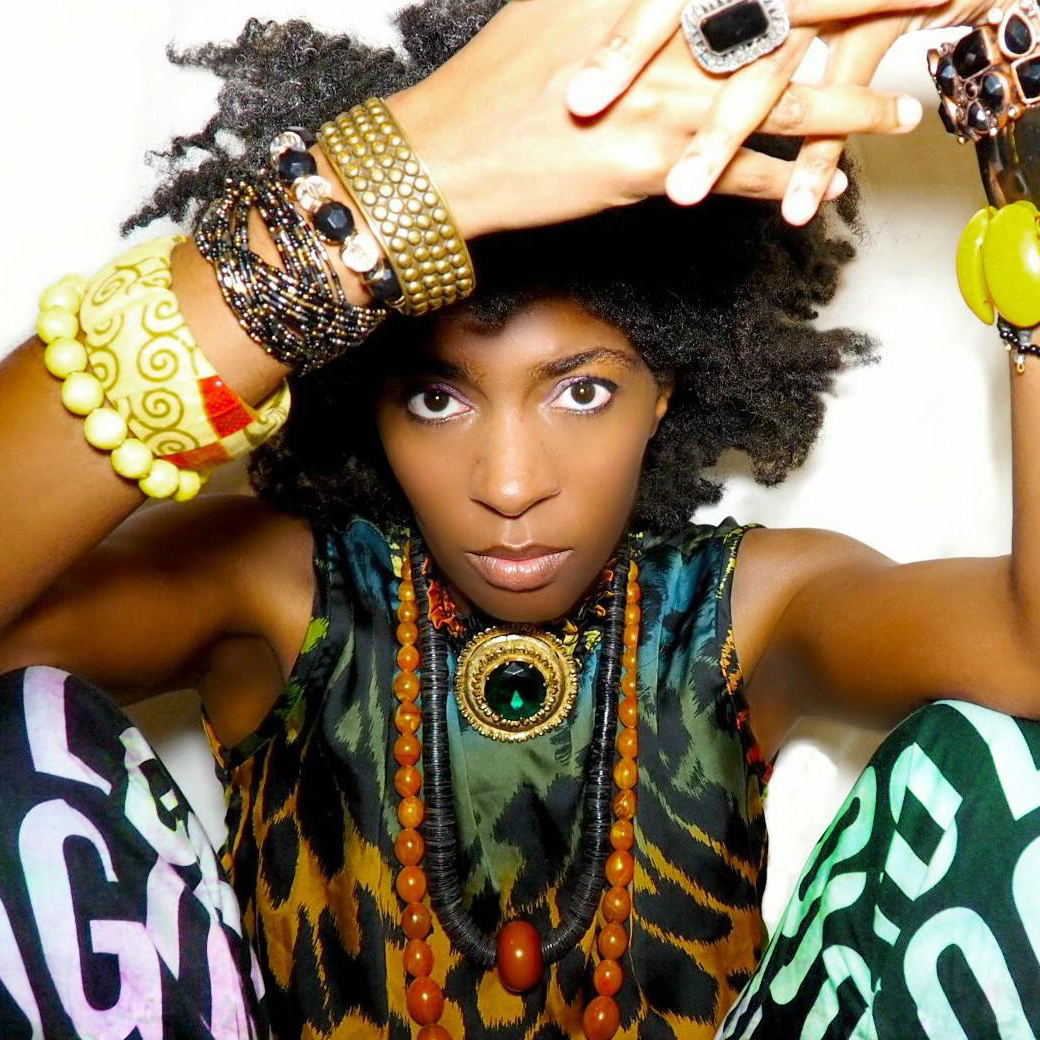
[ID: A person with brown skin looks into the camera from underneath their arms, which are clasped above their head displaying bracelets on their wrists. They are wearing a colorful patterned shirt and necklaces.]
CC Sunchild
They // Them // Theirs
Atlanta, GA
CC Sunchild is an American composer, orchestrator, producer, pianist, vocalist, and actor. Sunchild’s diverse training and experience in jazz, classical, gospel, and world music manifest into soulful performance and innovative expression through music composition and improvisation. They have traveled the world working with renowned artists Patti Labelle, Sir Elton John, Bruce Hornsby, India Arie, Bobby McFerrin, Ruben Studdard, Lil Durk, Raphael Saadiq, and Caron Wheeler, and they have performed as a musician and singer on film productions including Madea’s Witness Protection, The Detour, Hap and Leonard, Holidate, Star, and The Hate You Give. Sunchild also recently completed production as the pianist and piano hand double for the National Geographic series Genius: Aretha.
ccsunchild.com
Instagram: @ccsunchild
